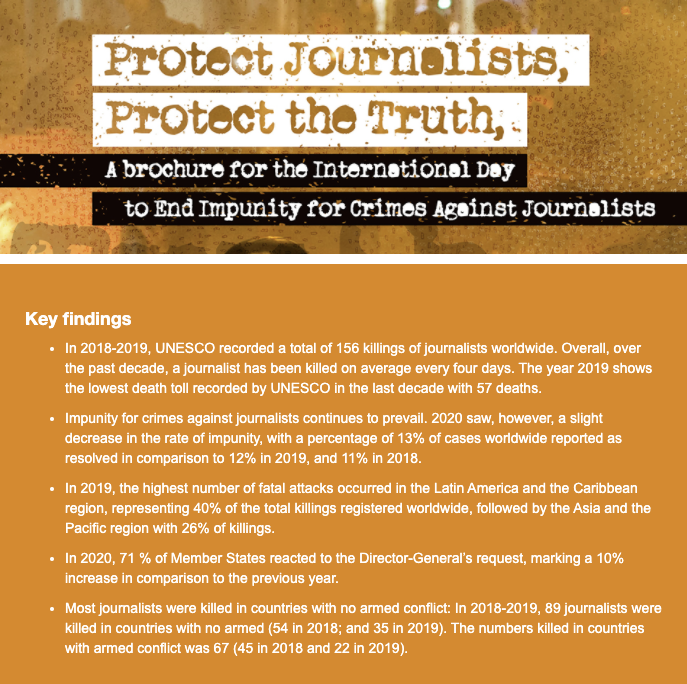
End Impunity for Crimes against Journalists
New York: The United Nations General Assembly proclaimed November 2 as the ‘International Day to End Impunity for Crimes against Journalists’ in General Assembly Resolution A/RES/68/163. The Resolution urged Member States to implement definite measures countering the present culture of impunity. The date was chosen in commemoration of the assassination of two French journalists in Mali on 2 November 2013.
This landmark resolution condemns all attacks and violence against journalists and media workers. It also urges Member States to do their utmost to prevent violence against journalists and media workers, to ensure accountability, bring to justice perpetrators of crimes against journalists and media workers, and ensure that victims have access to appropriate remedies. It further calls upon States to promote a safe and enabling environment for journalists to perform their work independently and without undue interference.
However, in the past fourteen years (2006-2019), close to 1,200 journalists have been killed for reporting the news and bringing information to the public. In nine out of ten cases the killers go unpunished. Impunity leads to more killings and is often a symptom of worsening conflict and the breakdown of law and judicial systems.
These figures do not include the many more journalists, who on a daily basis suffer from non-fatal attacks, including torture, enforced disappearances, arbitrary detention, intimidation and harassment in both conflict and non-conflict situations. Furthermore, there are specific risks faced by women journalists, including sexual attacks. Worryingly, only one in ten cases committed against media workers over the past decade has led to a conviction.
Did you know?
In the past decade, a journalist has been killed on average every four days.
The year 2019 shows the lowest death toll recorded by UNESCO in the last decade with 57 deaths.
In 2019, the highest number of fatal attacks occurred in the Latin America and the Caribbean region, representing 40% of the total killings registered worldwide, followed by the Asia and the Pacific region with 26% of killings.
Most journalists were killed in countries with no armed conflict.Source: UNESCO 2020
“This impunity emboldens the perpetrators of the crimes and at the same time has a chilling effect on society including journalists themselves. Impunity breeds impunity and feeds into a vicious cycle,” United Nations Secretary-General António Guterres said on November 3, 2020. He added: “If we do not protect journalists, our ability to remain informed and make evidence-based decisions is severely hampered. When journalists cannot do their jobs in safety, we lose an important defence against the pandemic of misinformation and disinformation that has spread online.”
When attacks on journalists remain unpunished, a very negative message is sent that reporting the “embarrassing truth” or “unwanted opinions” will get ordinary people in trouble. Furthermore, society loses confidence in its own judiciary system which is meant to protect everyone from attacks on their rights. Perpetrators of crimes against journalists are thus emboldened when they realize they can attack their targets without ever facing justice.
“Journalists are essential in preserving the fundamental right to freedom of expression, guaranteed by Article 19 of the Universal Declaration of Human Rights. When journalists are attacked with impunity, there is a breakdown in security and judicial systems for all.”
— Audrey Azoulay, Director-General of UNESCO
on the occasion of the International Day to End Impunity for Crimes against Journalists 2020
2020 UNESCO Director-General’s report on the safety of journalists and the danger of impunity

This year the World Press Freedom Conference 2020 on 9 and 10 December 2020, convened by UNESCO and the Kingdom of the Netherlands celebrates jointly World Press Freedom Day (3 May) and the International Day to End Impunity for Crimes against Journalists (2 November) in a new, innovative format, merging digital and in-person elements. The session on 10 December 2020, entitled “Strengthening investigations and prosecutions to end impunity for crimes against journalists” will include the presentation of guidelines for prosecutors on investigating and prosecuting crimes and attacks against journalists, developed in partnership with the International Association of Prosecutors.
– globalbihari bureau





